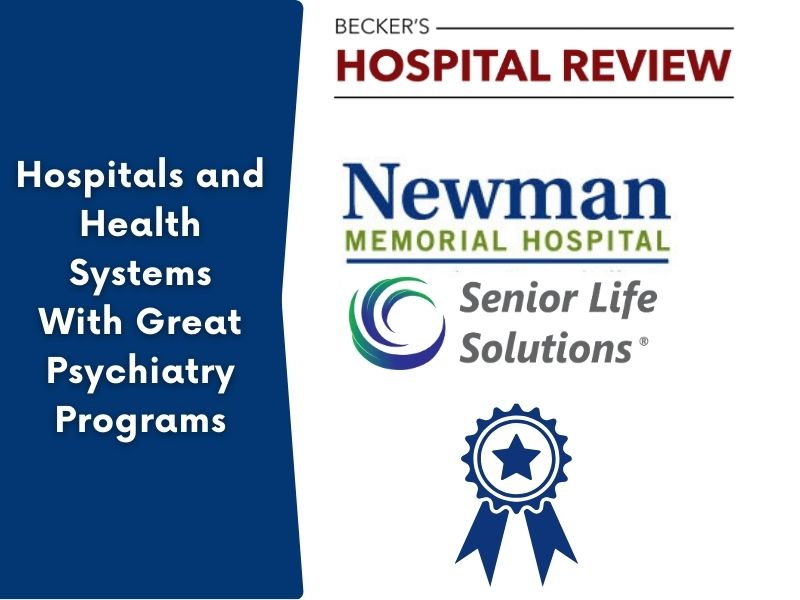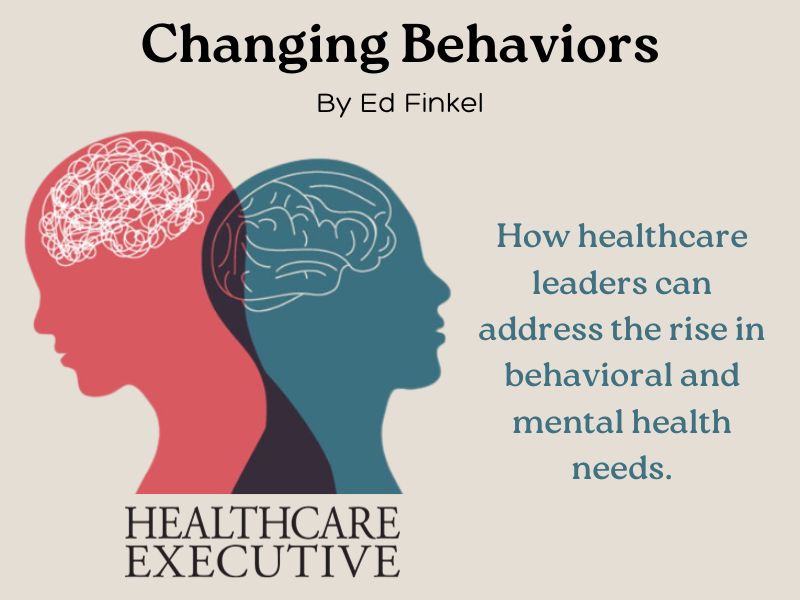Becker’s Hospital Review included Newman Memorial Hospital’s Senior Life Solutions Program on the first edition of its “Hospitals and Health Systems with Great Psychiatry and Mental Health Programs” list.
“Recognition on the national stage of healthcare is a true testament to the hard work, experience, innovation, and dedication of our team,” said Joey Burgtorf, chief operating officer of Newman Memorial Hospital. “They are in the trenches fighting to touch, transition, and enrich lives every day. Their victories are usually quiet ones that are only celebrated internally in their department. It’s wonderful to see this kind of recognition for the quality and uniqueness of our program.”
Senior Life Solutions is an outpatient program that combines psychiatry, group therapy, and individual therapy to support older adults who are experiencing symptoms of depression, anxiety, grief, or other mental health challenges. The hospital-based program, which is managed by Psychiatric Medical Care (PMC), opened at Newman Memorial Hospital in Shattuck, Okla. in the spring of 2022.
“I think it’s important for hospitals and healthcare systems to analyze the needs of their community and patient population,” Burgtorf said. “If you have a large 65+ community and a lack of mental health resources in your area, SLS could be a very good fit for your organization. This program is ideally suited for Critical Access Hospitals due to the structure of cost reporting. When you can find a program that is beneficial to your patients and can have a positive impact on the financial health of your facility, it’s a win-win. Partnering with PMC gives your administration the assurance that compliance and quality metrics are being met.”
The Newman Memorial Hospital program was named PMC’s “Rookie of the Year” program in 2023 for making a positive impact on the community and demonstrating a commitment to compliance, quality, and patient-centered care. Senior Life Solutions at Newman Memorial Hospital includes a board-certified psychiatrist, RN program director, licensed therapist, and office/patient coordinator.
“Our success is attributed to the compassion we extend to our patients, creating an environment for them to grow and acquire new coping or communication skills applicable to their daily lives,” said Crystal Gulley, Senior Life Solutions program director. “We are grateful to be part of such an exceptional community and express our appreciation to PMC and Newman Memorial Hospital for their unwavering support.”
To curate the list, Becker’s accepted nominations and took into consideration current service lines, expansions, funding, recent accomplishments, recognitions, and awards earned from other publications.
“Through this list, Becker’s aims to highlight the efforts, programs, and initiatives of hospitals and health systems across the U.S.,” said Anna Falvey, list writer for Becker’s Hospital Review. “This is not a ranking or a rating, but instead an opportunity to spotlight organizations making an impact on their communities.”
About Senior Life Solutions
Gulley said the Senior Life Solutions program’s goal is to consistently incorporate the three pillars of care, compliance, and community while adhering to PMC’s mission of enhancing the function and quality of life for our patients and fostering enthusiastic partnerships within our communities.
Program participants attend three group therapy sessions each week, and meet on a regular basis with a psychiatrist, and therapist for individual assessment and medication management. A majority of participants who complete the program experience a 36% overall improvement as measured with the geriatric depression scale and Zung anxiety scale. Senior Life Solutions helps participants gain the coping and communication skills to live a healthier, happier life.
“We recognize that by delivering optimal patient care, adhering to State and Federal guidelines, and cultivating relationships within our communities, we can sustain our success as a program,” she said.
PMC continues to identify hospitals in rural markets where behavioral health services for older adults are needed. If you’re interested in partnering with PMC contact us today. Our business development team can answer questions about the Senior Life Solutions program and supply your hospital with a cost analysis and revenue forecast.




